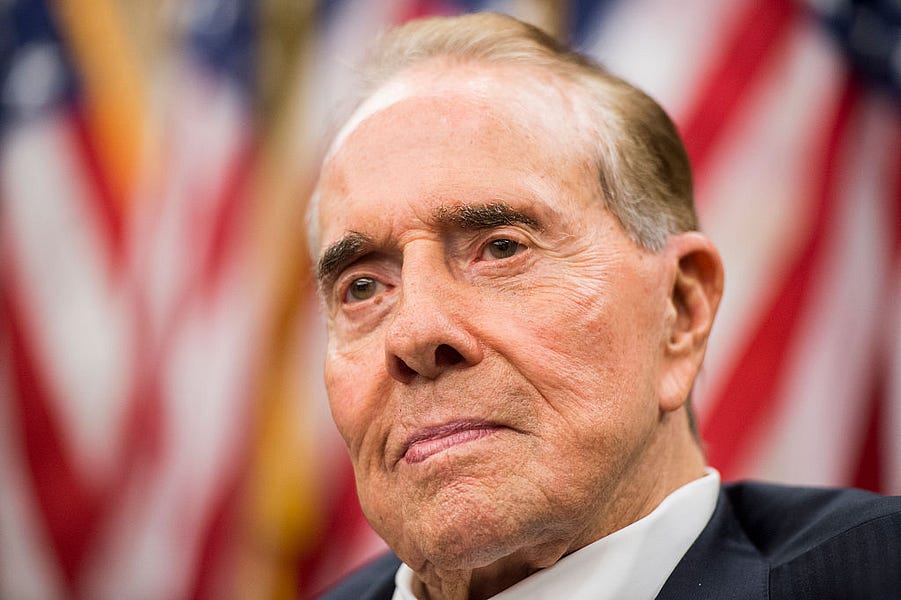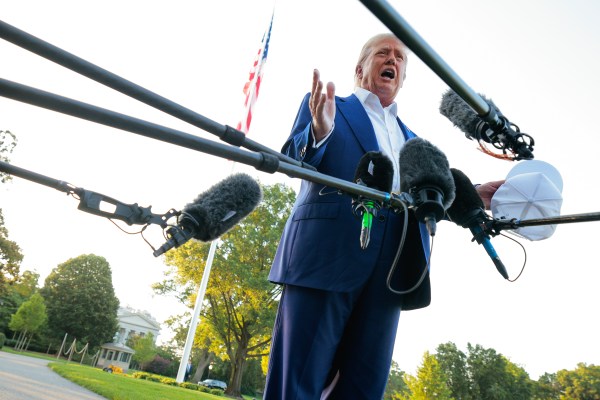The morning after he was named the Republican nominee for president in 1996, Bob Dole sat upstairs in his suite at a San Diego hotel doing the math. He was running behind Bill Clinton in the polls, had just named Jack Kemp to be his running mate, and—as usual—he didn’t love what he saw. What had Kemp bought him, he wondered aloud: “I’d say about two weeks, tops.”
He wasn’t wrong. Dole was a pragmatist and a realist, someone who had grown up in a hardscrabble Kansas town, suffered grievous wounds as an infantryman in World War II, and then dove head first into the toughest businesses of all: American politics. But because it was a business that was both deeply personal to him and a source of great joy, he would work with anyone to get the job done.
Dole became a great national leader not because he inspired people with rhetoric, but because he earned people’s trust with deeds. He measured his own success by the bills he helped pass, not the number of speeches he gave. Dole measured himself as Senate party leaders Everett Dirksen and Mike Mansfield had done before the C-SPAN age: deals done, bills passed, lives improved.
These were men who believed in Congress, who possessed virtues like moderation and recognition that not every concession is a defeat of principle; trust that is earned by negotiating in good faith; and the faith in compromise over ambition or ideology. These qualities are missing—if not extinct—in today’s polarized politics.
Dole could play hardball with the best of them. But he understood that America’s constitutional democracy, with its elegant system of checks and balances, requires our leaders to form a new majority on each issue. And he worked endlessly to find those majorities at a time when both parties still believed in compromise too.
Dole was never great at muscling legislation through Congress on the strength of one party’s temporary majority. I think he viewed it as a kind of failure. He knew only bipartisan coalitions represent the consensus view of the American people and therefore provide the only basis for effective governance.
In the 1970s, he teamed up with George McGovern to establish the school lunch program. In the 1980s, he and Patrick Moynihan joined forces to put Social Security on a sound financial footing for another generation. In 1990, he worked with Democratic Majority Leader George Mitchell to pass the Americans with Disabilities Act. Long after leaving the Senate, he worked with former adversary Tom Daschle to promote health care reform that could win bipartisan support. He didn’t trust ideologues: When negotiating in the 1990s with Newt Gingrich and the House rebels of their day, he had one question: What is your endgame?” They often had none.
Of course, the skills required to lead the Senate are not the same as those needed to be president, especially in the relentless glare of nonstop media that thrives on sharp disagreements, not subtle pragmatism. Even so, Dole ran for national office four times and was on two presidential tickets 20 years apart.
So how did someone with none of the gifts of a natural campaigner remain a top national candidate for that long? Though Dole would never say this, Americans saw in his life and character a confirmation of the American Dream. His efforts and achievements spoke to what we love about America and affirmed what is special and unique about our country.
Dole was severely wounded in battle as a young man. He lost the use of his right arm and bore his scars uncomplainingly until the day he died. To triumph over such adversity takes courage. To do so without bitterness testifies to extraordinary character. But to see in his own recovery a duty to further serve his country was an all-too-rare witness to patriotism that honors the best of the American spirit.
In his final years, we often spoke of national trends, Capitol Hill gossip, and Senate polling. He would ask me, “How’s Susan (Collins) doing in Aroostook County?” His depth of knowledge and political history made every discussion endearing and a special event. And even in his 90s, he had a thirst for current events and a relentless desire to understand the political environment. I already miss those conversations.
Scott Reed was Bob Dole’s campaign manager in 1996.






Please note that we at The Dispatch hold ourselves, our work, and our commenters to a higher standard than other places on the internet. We welcome comments that foster genuine debate or discussion—including comments critical of us or our work—but responses that include ad hominem attacks on fellow Dispatch members or are intended to stoke fear and anger may be moderated.
With your membership, you only have the ability to comment on The Morning Dispatch articles. Consider upgrading to join the conversation everywhere.